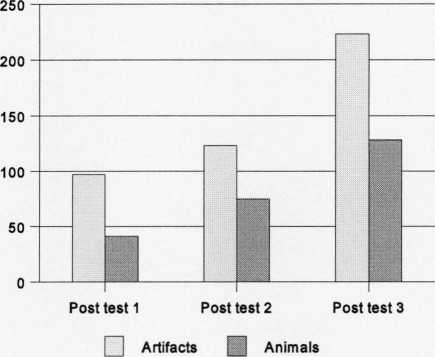P2: Z=4.9, p<.0000; P3: Z= 7.2, p<.OOOO). Separate analysis for each group demonstrated the
same pattern. The differences were significant for the Control (Wilcoxon: Z=4.01, p<.0005),
the Phonological control group (Wilcoxon: Z=4.1, p<.0000), the Ostensive definition group
(Wilcoxon: Pl: Z=2.7, p<.05; P2: Z=3.4, P3: Z=3.4, p<.0005), the Lexical contrast group
(Wilcoxon: Pl: Z=2.2, p<.05; P2: Z=1.9, p<.05; P3: Z=2.2, p<.05) and the Definition group
(Wilcoxon: Pl: Z=3.6, p<.0005; P2: Z=2.9, p<.005).
Figure 7.16 Total number of correct responses in the world knowledge questions by
semantic domain across testing

To what extent does the child’s prior lexical knowledge (Comprehension and Naming)
influence performance in the short questions task r!
Categorisation questions
Children with high level baseline comprehension vocabulary performed better than children
with low level baseline comprehension vocabulary. Significant differences were found for
post test 2 (Mann-Whitney U: Z=2.8, p<.005) and post test 3 (Mann-Whitney U: Z=3.3,
p<.005). Separate analysis for each group demonstrated the same pattern. Significant
differences were found for the Lexical contrast group during post test 1 (Mann-Whitney Lf:
Z=2.06, p<.05) and post test 3 (Mann-Whitney U: Z=2.3, p<.05).
In addition children with high level baseline naming vocabulary performed better than
children with low level baseline naming vocabulary. Significant differences were found for
post test 2 (Mann-Whitney U: Z=2.4, p<.05) and post test 3 (Mann-Whitney U: Z=3.1,
232
More intriguing information
1. Who runs the IFIs?2. Return Predictability and Stock Market Crashes in a Simple Rational Expectations Model
3. ¿Por qué se privatizan servicios en los municipios (pequeños)? Evidencia empírica sobre residuos sólidos y agua.
4. Yield curve analysis
5. sycnoιogιcaι spaces
6. The name is absent
7. EFFICIENCY LOSS AND TRADABLE PERMITS
8. Political Rents, Promotion Incentives, and Support for a Non-Democratic Regime
9. The name is absent
10. The Complexity Era in Economics